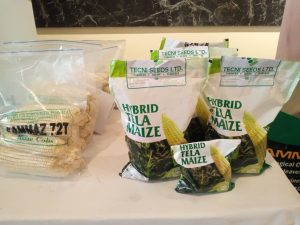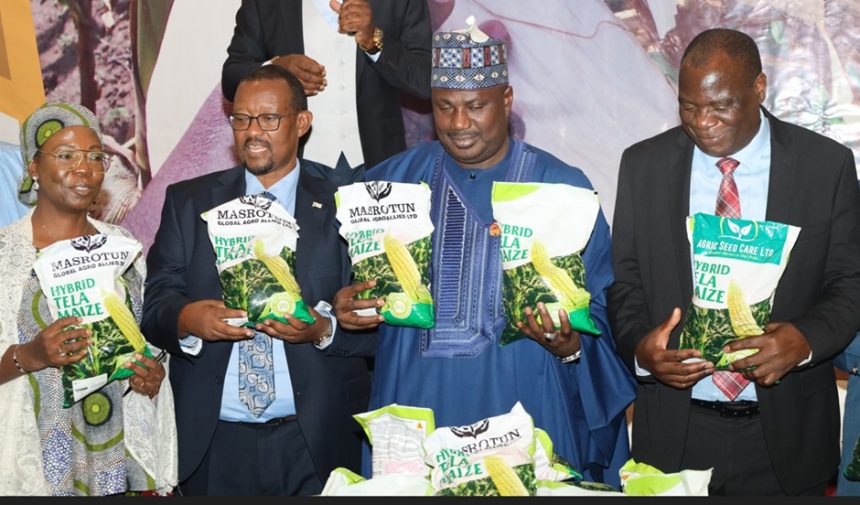By Onche Odeh
African countries have been urged to learn and adopt the Nigerian approach towards bridging the food supply gaps in the continent, especially with how the West African country has been able to localize the advantages of modern Agricultural Biotechnology.
Chair of the African Agricultural Technology Foundation (AATF) Board of Trustees, Prof. Aggrey Ambali who made this recommendation in his remarks during the official launch of four Hybrid Maize varieties known as TELA Maize in Nigeria on Tuesday said Nigeria has consistently demonstrated a forward-thinking approach to agriculture in recognition of the critical role that innovative technologies play in transforming the sector.
According to Amballi, the approval and introduction of TELA Maize and other biotech crops are clear indicators of the progressive mindset demonstrated by the government of Nigeria.
“By embracing these advancements, Nigeria is not only enhancing its own food security but also setting a powerful example for other African nations to follow.

“I urge other African nations to look to Nigeria’s example and consider the benefits that biotechnology can bring to their agricultural sectors,” said the AATF Board Chair stated, who also added that, by embracing innovative technologies, Africa can work towards becoming a food-secure continent where farmers are empowered, economies are strengthened, and the people are well-nourished.
“As the Chair of the AATF Board of Trustees, I am immensely proud of the collaborative efforts that have brought us to this day. The partnership between the Federal Government of Nigeria, research institutions, international organizations, investors, the private sector and farmers has been instrumental in achieving this breakthrough,” Ambali said.
Similar suggestion was also made by Mark Edge, Director, Seeds and Traits Business Development for Low and Middle Income Countries (LMICs) at Bayer Crop Science, who said Nigeria has demonstrated a rare feat with the speedy adoption and release of TELA Maize.
The TELA Maize project was launched as WEMA Project 15 years ago. Nigeria joined 2019, and for the government to have, within just five years put every machinery in use and released the crop is really commendable,”…said.
According to him, the ability of Nigeria to create independent institutional systems that guided the introduction, regulation and policy formulation for the adoption and localization of genetic engineering as a direct product of modern agricultural biotechnology within a short time is one thing that Africa and the world must study and adopt.
TELA Maize is a genetically modified version of the maize crop that is primed to resist the devastating Fall Army Worm (FAW), stem borer insects and tolerate drought.
With a yield potential of up to 10 tons per hectare, compared to the current average of 3 tons per hectare, experts have said TELA maize represents a groundbreaking development in efforts to boost Nigeria’s agricultural productivity. This substantial increase in yield is poised to significantly bridge the annual maize production gap, thereby contributing immensely to national food security and the livelihoods of countless farmers.
AATF’s Executive Director, Dr. Canisius Kanangire, in his remarks said the launch of TELA Maize heralds a new era for agricultural innovation and resilience in Nigeria and Africa.
Speaking in this context, Kanangire said, “The TELA Maize varieties we are launching today are a testament to the commitment by AATF and the Federal Government of Nigeria towards bringing advanced, resilient crop varieties to our farmers. These maize varieties are drought-tolerant and resistant to the devastating Fall Armyworm and Stem borer pests, which have plagued maize crops across the continent.”
He said, by promoting policies that support agricultural innovation, the Federal Government of Nigeria has created an enabling environment for the development and use of genetically modified crops that are safe, productive, and beneficial to smallholder farmers and the environment.
This was buttressed by Nigeria’s Minister of State for Agriculture and Food Security, Aliyu Sabi Abdullahi, who affirmed the safety of the new varieties of Maize.
According to the Minister, the deployment of biotechnological tools in the country is not by accident. He said it is well-structured and guided by national safety procedures and implemented by a competent national authority with a clear mandate to protect the health of Nigerians and the environment.
In concluding, he said the official launch of the TELA Maize varieties marks the beginning of a new era for Nigerian agriculture. It is a symbol of progress, resilience, and hope for our farmers.
Similar affirmation also came from Nigeria’s Coordinating Minister of Health and Social Welfare, Professor Mohammed Ali Pate, who said maize is a significant part of the country’s move to become food secure.
Speaking through the Director of Nutrition at the Federal Ministry of Health, Mrs Ladidi Aiyegbusi, the minister said maize is one of the most widely consumed food crops in Nigeria, urging the adoption of the TELA Maize as an option for mitigating nutrition and food crisis in the country.





